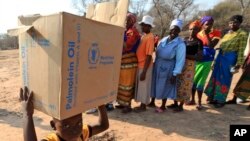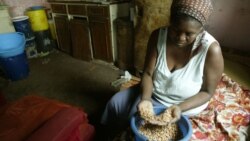The festive season is normally a time for family gatherings and generally to share food with loved ones and friends, but for many Zimbabweans most events so far show that there is little to celebrate in a nation almost crippled by a non-performing economy.
Some residents of Chihota and Domboshawa feel that the situation is likely to worsen in 2016.
Zimbabweans have been riding a political and economic roller-coaster during the course of the year, with upheavals on the political and economic fronts.
The uncertainties have been felt by both those in urban and rural areas. Addressing a Southern African Political and Economy Series (SAPES) Trust policy dialogue forum in Harare recently, president of the People’s Democratic Party, Tendai Biti, said 2015 was a difficult year for Zimbabweans.
“It was a year of toxicity, a year of intolerance, a year of conflict, of division, a year of hatred. We have seen the increase in decibels of hatred right across the length and breadth of the country. To me the existence of this culture of intolerance, culture of hatred does not serve the ordinary man and woman on the street.
Biti said the country is now in an economic depression with serious consequences for industry.
He said, “The characteristics of that depression in this country are there. You have massive unemployment and accelerated de-industrialisation. Ninety one percent of our people are now employed in the informal sector. In the brief period between the 17th of July 2015 and now over 40,000 workers have lost their jobs.
CHILDREN’S LIVES DOOMED
Sixty seven year-old Amos Murape from Mungate village in Domboshawa says the economic crisis is being felt in the area. He says most people are failing to send their children to tertiary institutions.
Murape says, “My friends and my brothers, my sisters, my relatives they have got some kids who are not going to school. So I feel pity because those children cannot look after us tomorrow if they are not getting anything.
Forty eight year-old Mary Murape from the same village says corruption, which was widely reported in the cities and towns, has not spared rural areas.
“Everyone is now corrupt, no one is straight-forward. When I was looking for a Form Five place I went to 12 boarding schools each saying they wanted five As (Advanced Level subjects) for the child to get a place. I went round and went round until I gave up. I had to go to Uzumba, and for me to go there it was because my aunt knew the headmaster. If you don’t know anyone life is difficult.”
Ms. Murape says the girl child is being affected most by the unemployment and lack of disposable income among villagers.
“They just go to school up to Form Four and that is the end. The parents have no money for them to further their education. Most of them were born here in Domboshawa, they grew up here, they don’t know anywhere else.”
The mother of two says in the year ahead politicians should focus on simple solutions, such as constructing vocational training centres in the area to empower young girls and boys with skills.
APPEAL FOR FOOD AID
It’s not only education that is worrying people in this part of Zimbabwe. A community social worker in Mutenda village in Chihota, Jericho Mandere, says authorities should now consider food aid for the area because of drought in the area.
Mandere says, “In the rural areas the picture is simply clear, there is no rain, there is no food so it’s going to be very difficult. But if we unite as a community maybe there is an opportunity for us. But other than that there is no future.”
He says politicians should stop fighting among themselves and work with the people to solve problems in rural areas.
“It remains with those who have the ball, whether they play it this way or that way, otherwise if they keep on fighting among themselves then here at the bottom we don’t have any chance. If we can mix the political game and the economic game and they work together compatibly, we have an opportunity.”
Political analyst Brian Kagoro says at this juncture both the ruling party and the opposition should put aside their differences and find solutions for the problems facing the country.
“We are fighting over positions not clarity of ideas which shape a nation, ideas that shape an economy. So everyone is worried about which strong man, which more thuggish character will outdo the other. So it does not matter which thug you put in power, we still need to have food on our tables, we need to have jobs for the 300,000 school leavers we produce every year otherwise we are creating a criminal state.”
WHAT NEXT?
Award-winning Zimbabwean writer, Petina Gappah, says in 2016 Zimbabweans should take full responsibility for their destiny instead of putting their fate in political parties.
“How do we take back the struggle as Zimbabweans? Do we leave it to the political parties? Do we leave it to Zanu PF to sort out their succession mess? Do we leave it to the MDC? There is something really scary (about) what is happening to the fabric of society. What is our vision for ourselves as Zimbabweans? I think that is the agenda that we need to take back.”
Despite these challenges, Zimbabweans still hope for a new year full of joy and happiness. Will this happen in 2016? Only time will tell.






